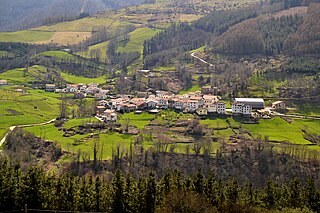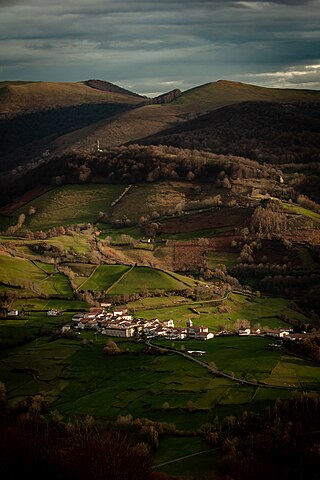
Goizueta is a town and municipality located in the province and autonomous community of Navarre, northern Spain.

Goizueta is a town and municipality located in the province and autonomous community of Navarre, northern Spain.
The Spanish conquest of Iberian Navarre started in 1512 with a Guipuzkoan militia capturing it on 10 July 1512.

Henry II, nicknamed Sangüesino because he was born at Sangüesa, was the King of Navarre from 1517, although his kingdom had been reduced to a small territory north of the Pyrenees by the Spanish conquest of 1512. Henry succeeded his mother, Queen Catherine, upon her death. His father was her husband and co-ruler, King John III, who died in 1516.

Lower Navarre is a traditional region of the present-day French département of Pyrénées-Atlantiques. It corresponds to the northernmost merindad of the Kingdom of Navarre during the Middle Ages. After the Spanish conquest of Iberian Navarre (1512–24), this merindad was restored to the rule of the native king, Henry II. Its capitals were Saint-Jean-Pied-de-Port and Saint-Palais. In the extreme north there was the little sovereign Principality of Bidache, with an area of 1,284 km2 (496 sq mi) and a decreasing population of 44,450, 25,356.

Roncesvalles is a small village and municipality in Navarre, northern Spain. It is situated on the small river Urrobi at an altitude of some 900 metres (3,000 ft) in the Pyrenees, about 4 kilometres (2.5 mi) from the French border as the crow flies, or 21 kilometres (13 mi) by road.

Blanche II was the titular Queen of Navarre between 1461 and 1464. She was the daughter of John II of Aragon and Blanche I of Navarre. She was also Princess of Asturias by marriage to Henry of Castile.

Francis Phoebus was King of Navarre (1479–1483), Viscount of Bearn, and Count of Foix (1472). He was the son of Gaston, Prince of Viana, and grandson of Queen Eleanor, whom he succeeded. She recommended him to ally with France.

Catherine was Queen of Navarre from 1483 until 1517. She was also Duchess of Gandia, Montblanc, and Peñafiel, Countess of Foix, Bigorre, and Ribagorza, and Viscountess of Béarn.

Arano is a village and municipality located in the province and autonomous community of Navarre, northern Spain.

Arantza is a town and municipality located in the province and autonomous community of Navarre, northern Spain.

Areso is a town and municipality located in the province and autonomous community of Navarre, northern Spain.

Basaburua is a town and municipality located in the province and autonomous community of Navarre, northern Spain.

Donamaria is a town and municipality located in the province and autonomous community of Navarre in northern Spain.

Eratsun is a town and municipality located in the province and autonomous community of Navarre, northern Spain.

Oitz is a town and municipality located in the province and autonomous community of Navarre, northern Spain.

Saldías is a town and municipality located in the province and autonomous community of Navarre, northern Spain.

Ultzama is a municipality located in the province and autonomous community of Navarre, northern Spain. Ultzama is also the name of the river from which the valley takes its name. It is located 22 km North of Pamplona, the capital city of Navarre.

Urrotz is a town and municipality located in the province of Navarre, in the autonomous community of Navarre, northern Spain.

Zubieta is a town and municipality located in the province and autonomous community of Navarre, northern Spain.

The Viscounty, later Principalityof Béarn, was a medieval lordship in the far south of France, part of the Duchy of Gascony from the late ninth century. In 1347, the viscount declared Béarn an independent principality without feudal obligations. It later entered a personal union with the Kingdom of Navarre in 1479 and with France in 1589. In 1620, the prince formally incorporated Béarn as a province of France.

The Spanish conquest of the Iberian part of Navarre was initiated by Ferdinand II of Aragon and completed by his grandson and successor Charles V in a series of military campaigns lasting from 1512 to 1524. Ferdinand was both the king of Aragon and regent of Castile in 1512. When Pope Julius II declared a Holy League against France in late 1511, Navarre attempted to remain neutral. Ferdinand used this as an excuse to attack Navarre, conquering it while its potential protector, France, was beset by England, Venice, and Ferdinand's own Italian armies.

Leitzaldea is a comarca in Navarre, Spain.
Bustillo Kastrexana, Joxerra (2012). Guía de la conquista de Navarra en 12 escenarios. Donostia: Txertoa Argitaletxea. ISBN 978-84-71484819